5 Reasons to Use MCT Oil for Ketosis:
MCT oil or medium chain triglycerides (MCTs) are unique fatty acids that are found naturally in coconut and palm oils. They have a remarkable ability to stabilize blood sugar and enhance ketone body production. This process makes MCTs a powerful tool to reduce inflammation, improve metabolism, and enhance cognitive function.
The term “medium” is in reference to the length of the chain of fatty acids. Oils can have short, medium, or long chains. Most oils are a combination of short, medium, and long chain fatty acids.
Medium chain fatty acids by definition are fatty acids that contain between 6 and 12 carbon chains (1). These include:
- C6 – Caproic Acid
- C8 – Caprylic Acid
- C10 – Capric Acid
- C12 – Lauric Acid
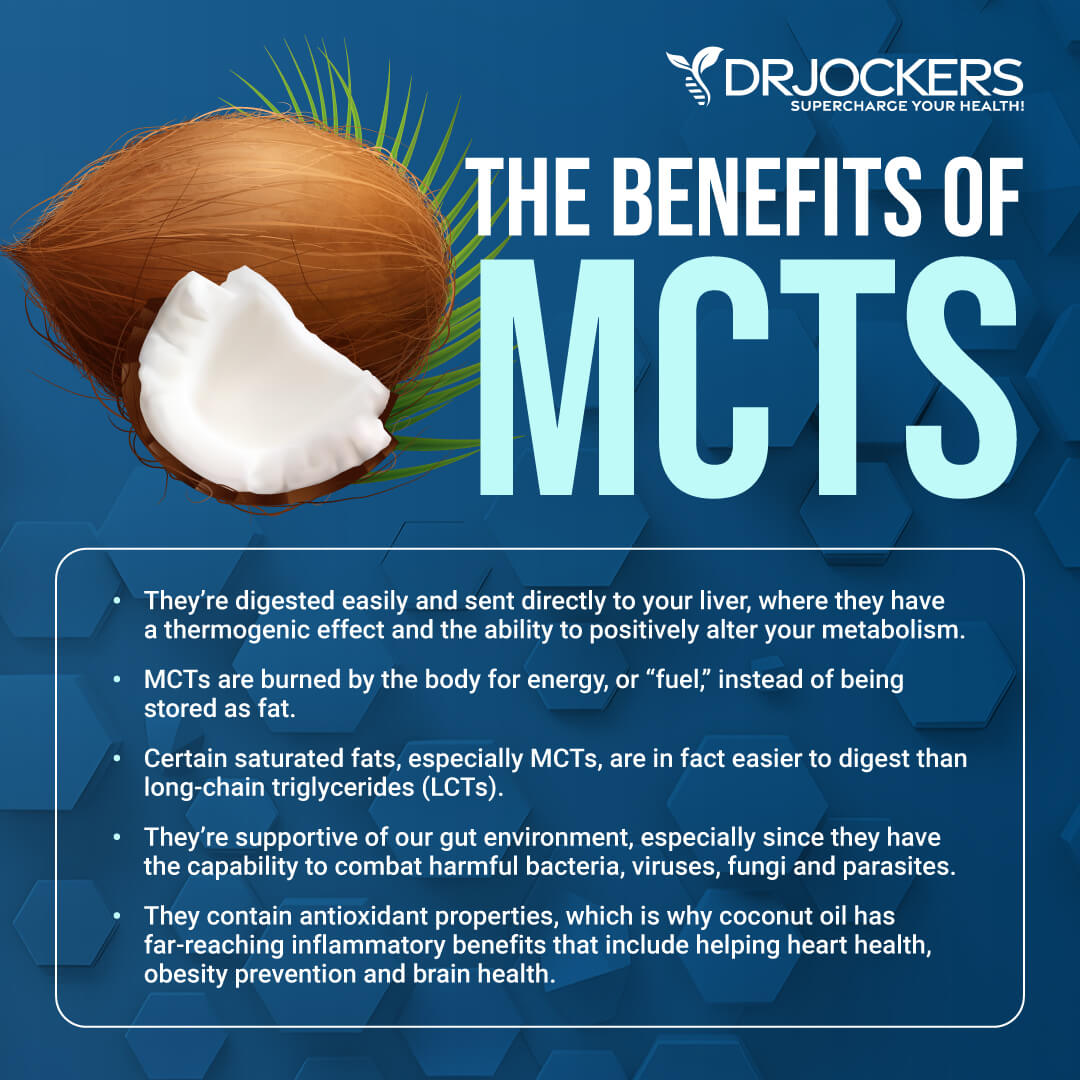
MCTs Are Easily Digested:
MCTs are easily digested and do not require the production and utilization of bile. Most fatty acids depend upon bile salt emulsification in order to be metabolized and absorbed. The production of bile is an energy dependent process that takes place in the liver. The body stores extra bile in the gallbladder to use for high fat meals.
Individuals with a sluggish liver and gallbladder struggle to produce adequate bile. Other individuals who struggle with malnutrition or malabsorption syndromes can easily absorb and utilize these MCTs (2). This includes people with pancreatitis, cystic fibrosis & Crohn’s disease among others.
MCTs have a slightly lower caloric effect than typical long-chain fatty acids (LCFA). LCFAs have 9 calories per gram while MCTs have 8.3 calories per gram (3).
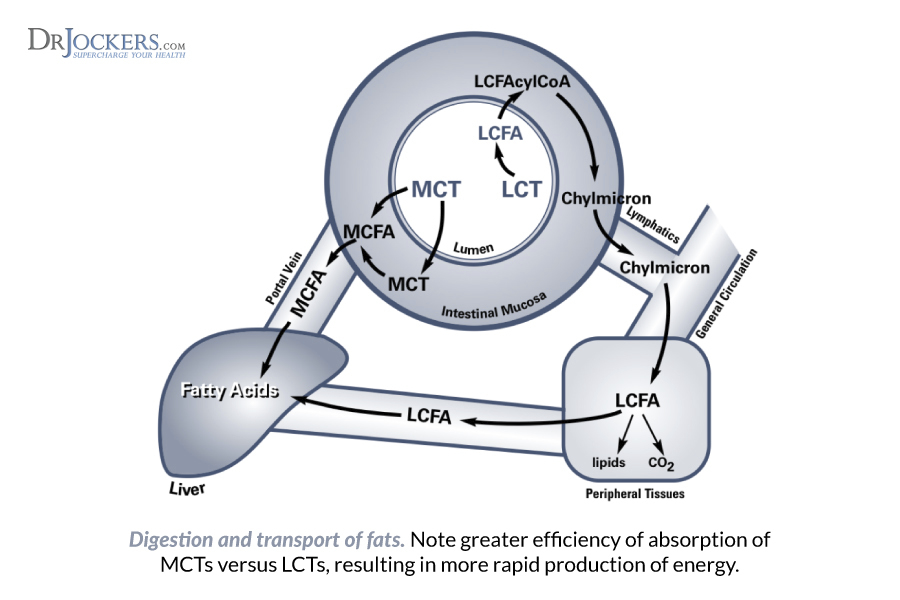
How MCTs Work:
The mitochondria are small organs within your cells that are responsible for producing all the energy needed by your tissues. Fatty acids produce energy in the mitochondria but are dependent upon the L-carnitine compound in order for entry. MCTs provide immediate energy because they are able to cross the double mitochondrial membrane very rapidly and do not require the presence of carnitine (4).
This results in the production of excess acetyl-coA which breaks down into ketones. The rapid formation of ketone bodies gives immediate energy and enhances brain function and athletic performance.
Many experts say that MCTs act like carbohydrates because they provide an immediate energy source. However, MCTs do differ from carbohydrates in that they do not raise blood sugar or increase insulin levels as carbohydrates do.
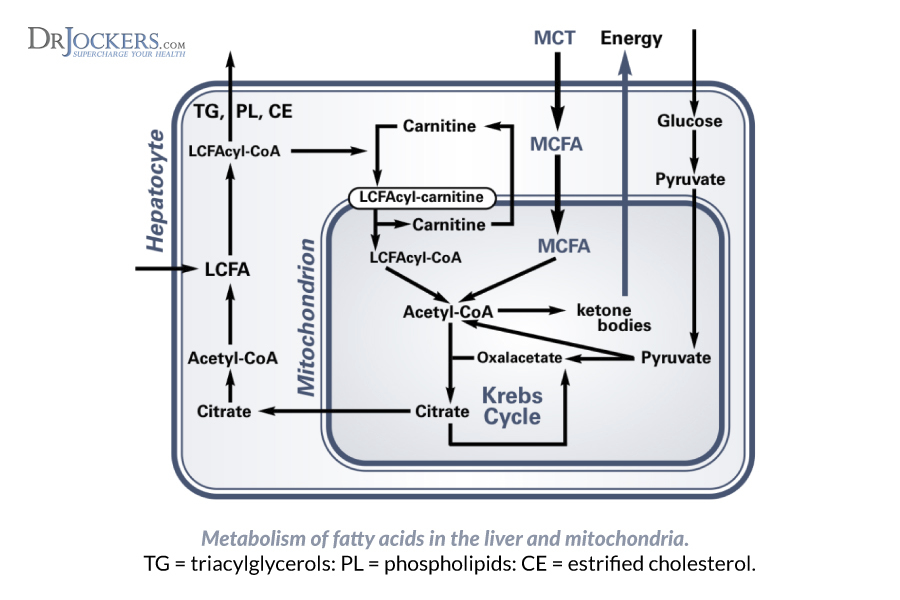
What are Ketones:
The body has two major energy sources, it burns glucose or ketone bodies. The majority of people burn glucose primarily because they are constantly supplying a steady form of sugar, starches, and proteins that can be turned into blood sugar. When one either fasts or goes on a low-carb, moderate protein, and high fat diet they switch their energy source to fat.
In particular, the fatty acids are broken down into ketone bodies. The three major forms of ketones produced in the body include Acetoacetate, Acetone, and Beta-HydroxyButyric acid. These are released into the blood from the liver when insulin levels are low and hepatic liver metabolism is increased (4).
Ketones as a Preferred Fuel for the Brain:
Ketones are unique energy producing molecules made from fatty acids. Our bodies can make them from stored fat or from MCTs. Ketones feed all the cells of the body, but in particular, they are a preferred fuel for the brain.
Research has demonstrated that MCTs can readily cross the blood-brain barrier (BBB) and be oxidized by the brain (5). Thus, MCTs may provide both a direct and an indirect brain fuel source via the generation of ketones. This is incredibly important for everyone, especially those with type 1 diabetic patients as it gives us all a strategy to preserve brain function during hypoglycemic episodes without raising blood glucose levels (6).
Ketones activate specialized regulatory proteins in the brain called brain derived neurotrophic growth factors (BDNF) (7). BDNF works to repair, protect, and enhance the function of the brain cells and the neurological networks. BDNF also stimulates the growth of new, healthy neurons that take the place of older, dying cells. The inability to regulate dead or dying brain cells is a risk factor for neurodegenerative disease processes.
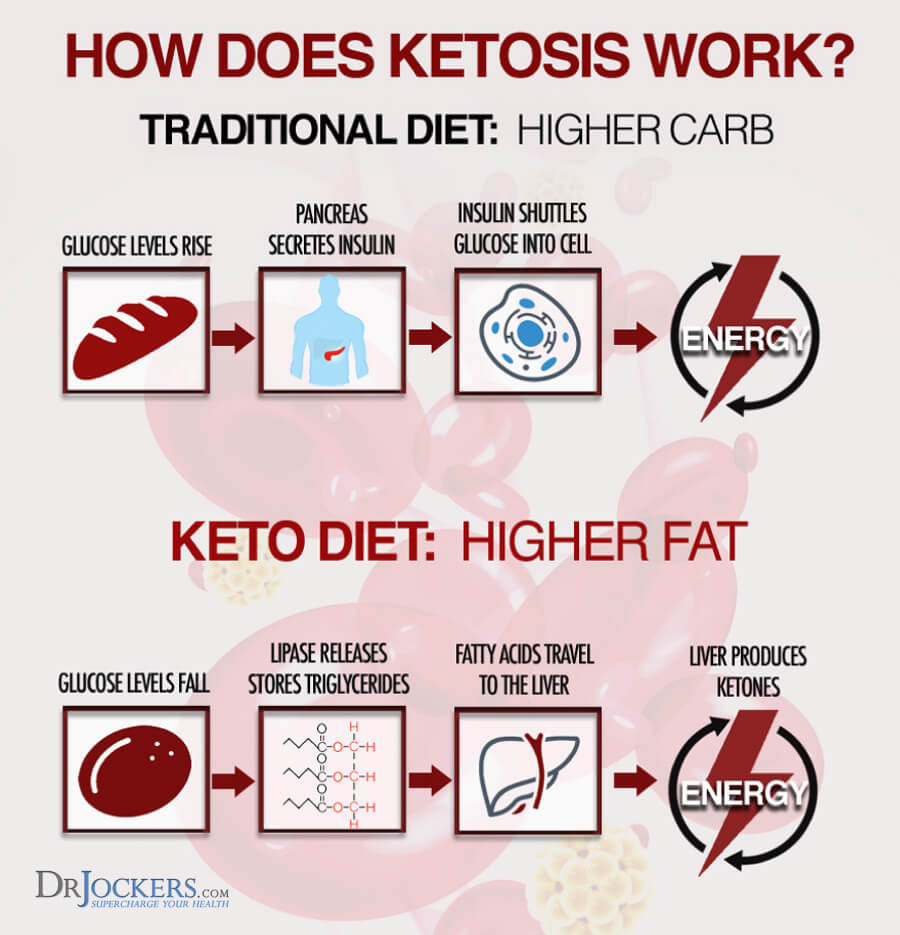
Natural Sources of MCT Oil:
The best natural source of MCTs is found in coconut oil. Palm oil, camphor tree oil, goat’s milk, and grass-fed butter or ghee are all good sources of MCTs as well. Coconut oil is nature’s richest source of C12 lauric acid. Lauric acid is very good for the immune system which is one of the reasons why coconut oil has such tremendous health benefits.
Many individuals thrive off of grass-fed dairy products such as raw milk, kefir, yogurt, and cheese. Other individuals struggle with lactose and dairy proteins casein and whey. Grass-fed butter and ghee are typically well tolerated by most individuals.
Ghee is the only dairy product that is fully pure of casein, lactose, and whey. When I have a client with skin issues (eczema or acne), autoimmune issues, or leaky gut, I always start by removing all dairy except grass-fed ghee, which is often well-tolerated.
You can also get a pure MCT oil that is concentrated in caprylic and capric acid. An MCT oil is processed in a manufacturing plant to remove all the longer chain fats and other compounds except these two fatty acids. But be careful with the brand of MCT oil you purchase as it is important to get one that is tested for purity and heavy metals.
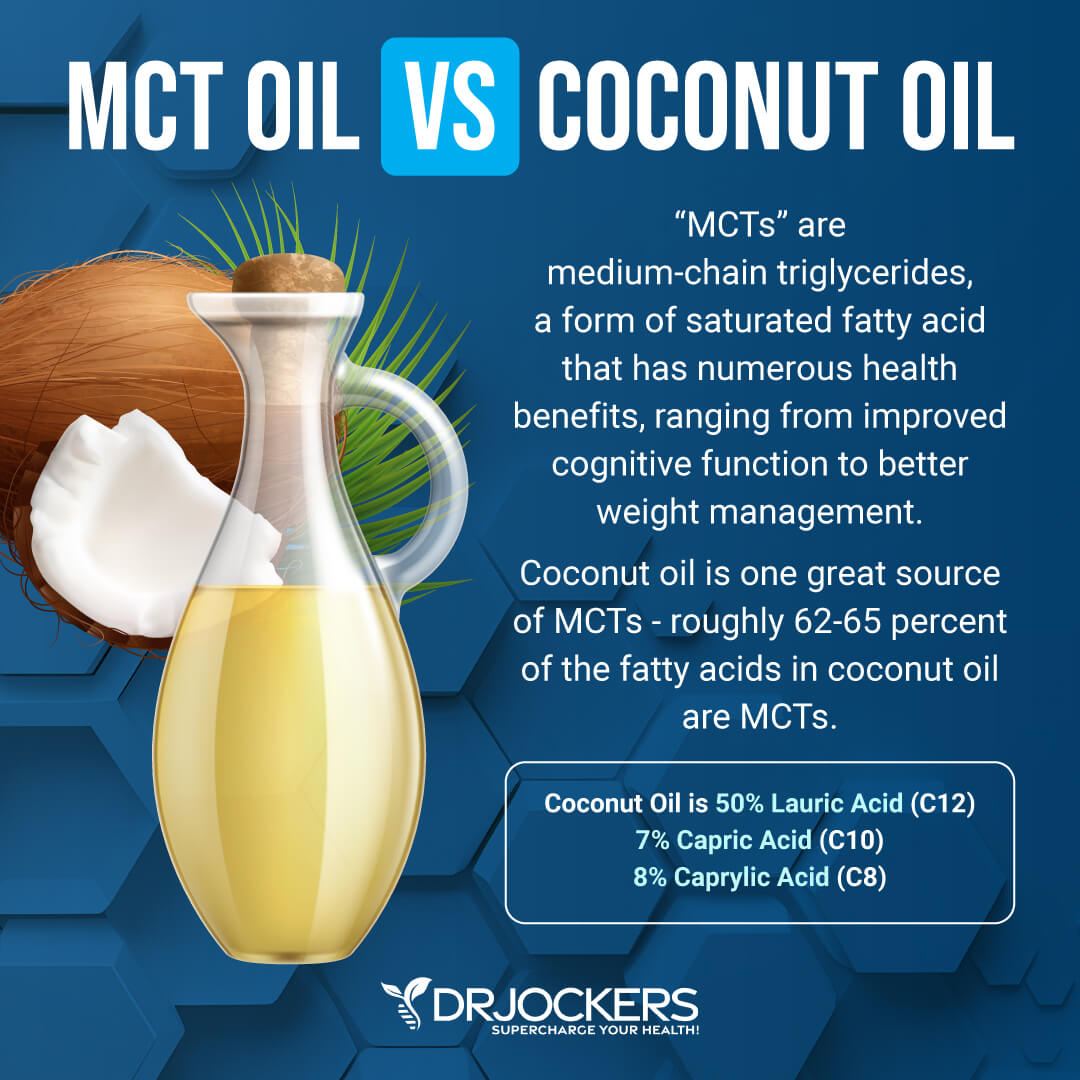
Caproic Acid:
This is the smallest chain MCT at 6 carbon chains. There is an extremely small amount of this in our normal food supply. It has the potential to cause digestive problems including diarrhea and throat burning.
Caprylic Acid:
Caprylic acid is an 8 carbon MCT is found in only 6% concentration in coconut oil but is considered the gold nugget of the MCTs. It has the most potent of anti-microbial properties that help to destroy bad bacteria and yeast.
Caprylic acid is easier than lauric acid in the production of cellular fuel (8). In fact, it only takes 3 steps to turn it into cellular energy (ATP). Sugar takes 26 steps to produce cellular energy and is therefore highly metabolically expensive. The more concentrated an MCT oil is in caprylic acid the more mitochondrial strengthening the product will be.
Capric Acid:
This 10-carbon chain fatty acid is also a very powerful MCT that turns into easy energy within the mitochondria of the cell without any work from the liver. Capric acid has also been shown to have great anti-microbial effects against bacteria such as P. acnes, E. coli, and Candida albicans (9, 10, 11).
Research has also shown that capric acid helps to reduce inflammatory activity against bone tissue (12). This provides evidence of its benefit in preventing bone loss and osteoporosis.
Lauric Acid:
This is a 12-carbon chain fatty acid that makes up around 50% of the fatty acids within coconut oil. The metabolism of lauric acid is different than the other three MCTs. In fact, even though lauric acid is considered an MCT, it actually acts more like a long-chain fatty acid. It depends upon liver bile to be effectively metabolized (13)
Lauric acid is an effective anti-microbial but research has shown that caprylic and capric acids are more effective than lauric acid (14, 15) and infectious organisms such as gonorrhea and chlamydia (16, 17). Caprylic acid is a common supplement used in anti-yeast protocols and small intestinal bacterial overgrowth protocols.
1. MCT Oil Lowers Blood Sugar:
MCTs raise up ketones and lower blood sugar naturally. They have a strong blood sugar–stabilizing effect that helps to reduce inflammation and improve brain function (18).
After a single oral dose of MCTs, a slight drop in blood sugar develops (19). It is caused, apparently, by a decrease in the liver output of glucose and not by an increase in the body’s utilization of glucose. MCTs significantly improve carbohydrate tolerance and inhibit the production of fatty acids in adipose (fat) tissue (20).
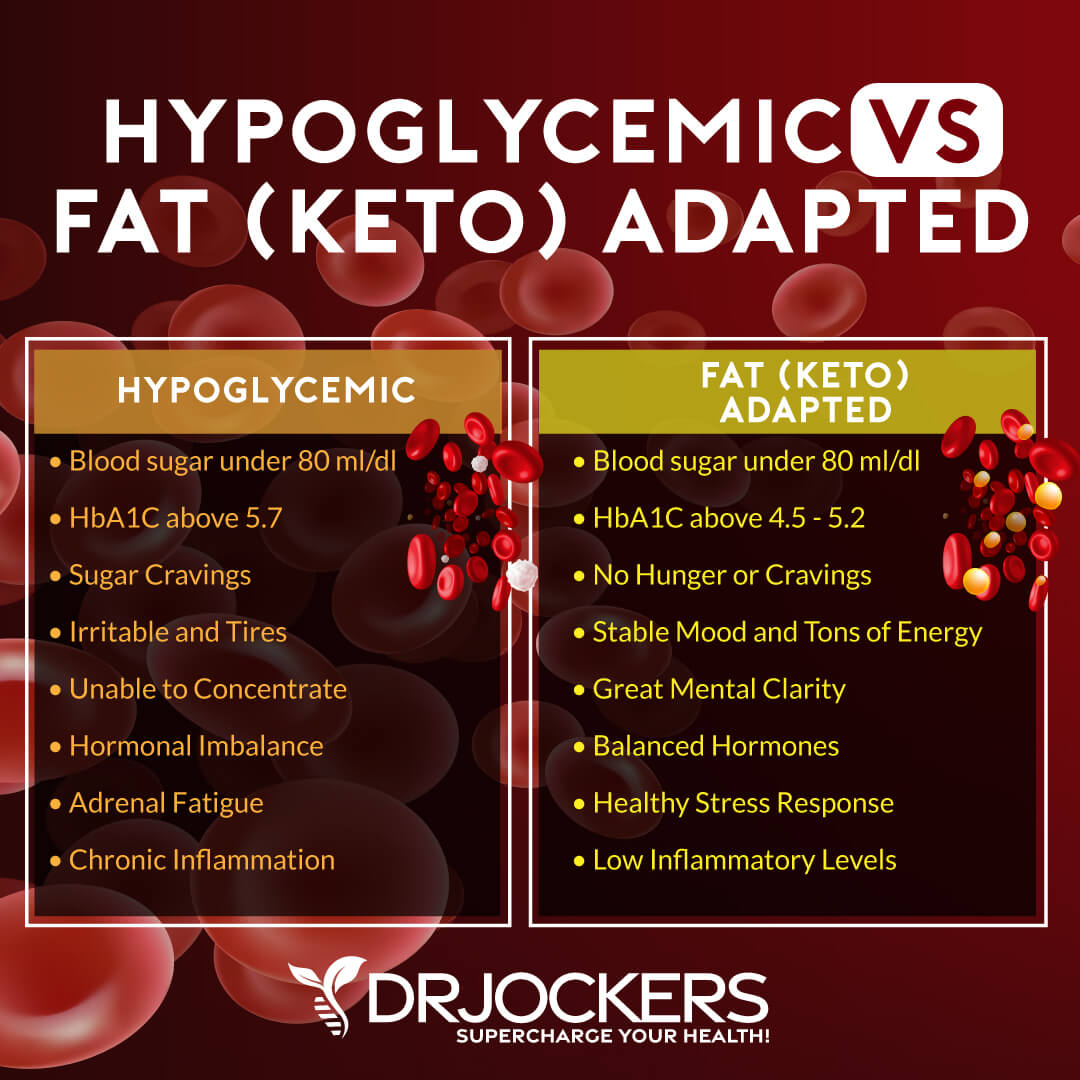
2. Increased Nutrient Absorption:
MCTs improve the absorption of calcium and magnesium in premature infants. One study looked at 34 pre-term infants. The infants were divided into 3 groups and fed various formulas.
Group 1 had corn oil, oleic, and coconut oil (39:41:20); Group 2: MCT, corn oil, and coconut oil (40:40:20); Group 3: MCT and corn oil (80:20). The infants fed MCT-containing formulas absorbed significantly more calcium than the control group. Magnesium absorption was significantly increased in the 80% MCT group (21).
These same groups were then analyzed for protein absorption and nitrogen content. The 80% MCT group had significant improvements in nitrogen absorption and amino acid sparing (22). This means the body will be more effective at preserving and building lean body tissue when using MCT oil.
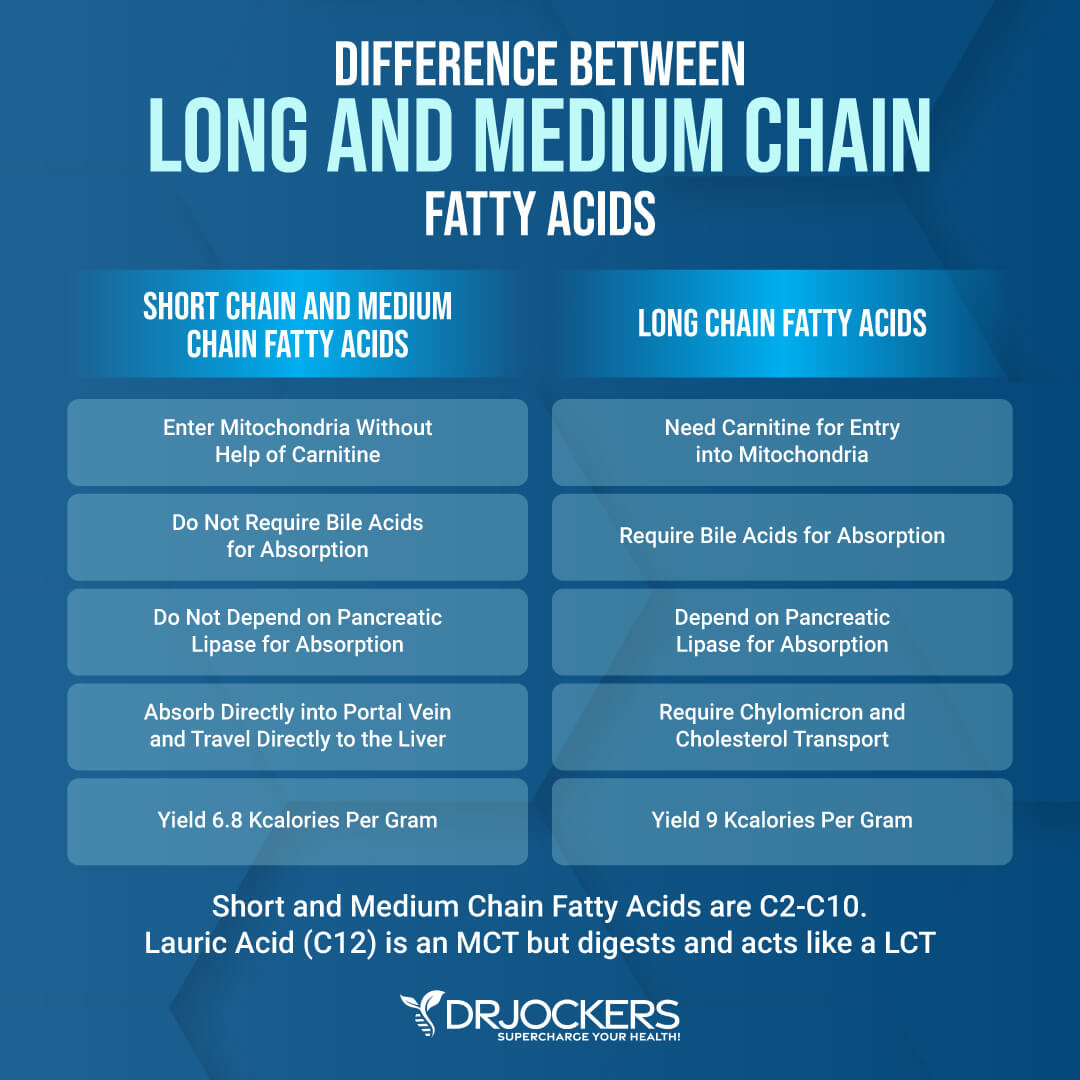
3. Natural Anti-Convulsive:
The production of ketones has powerful anticonvulsive properties on the brain that have long been used as a treatment for individuals with epilepsy. The traditional ketogenic diet which is LCFA based and is used for anti-convulsive benefits is made up of 87% of the calories from fat. This is extremely hard to follow and compliance is often very low.
The use of MCTs, which as described are highly ketogenic, makes it much easier to get into and stay in ketosis. An MCT-based diet only depends upon 60-70% of calories from fat which allows one to handle some nutrient dense sources of carbohydrate and protein. The diversity of the diet provides more micronutrients, has greater variety, and is more enjoyable (23).
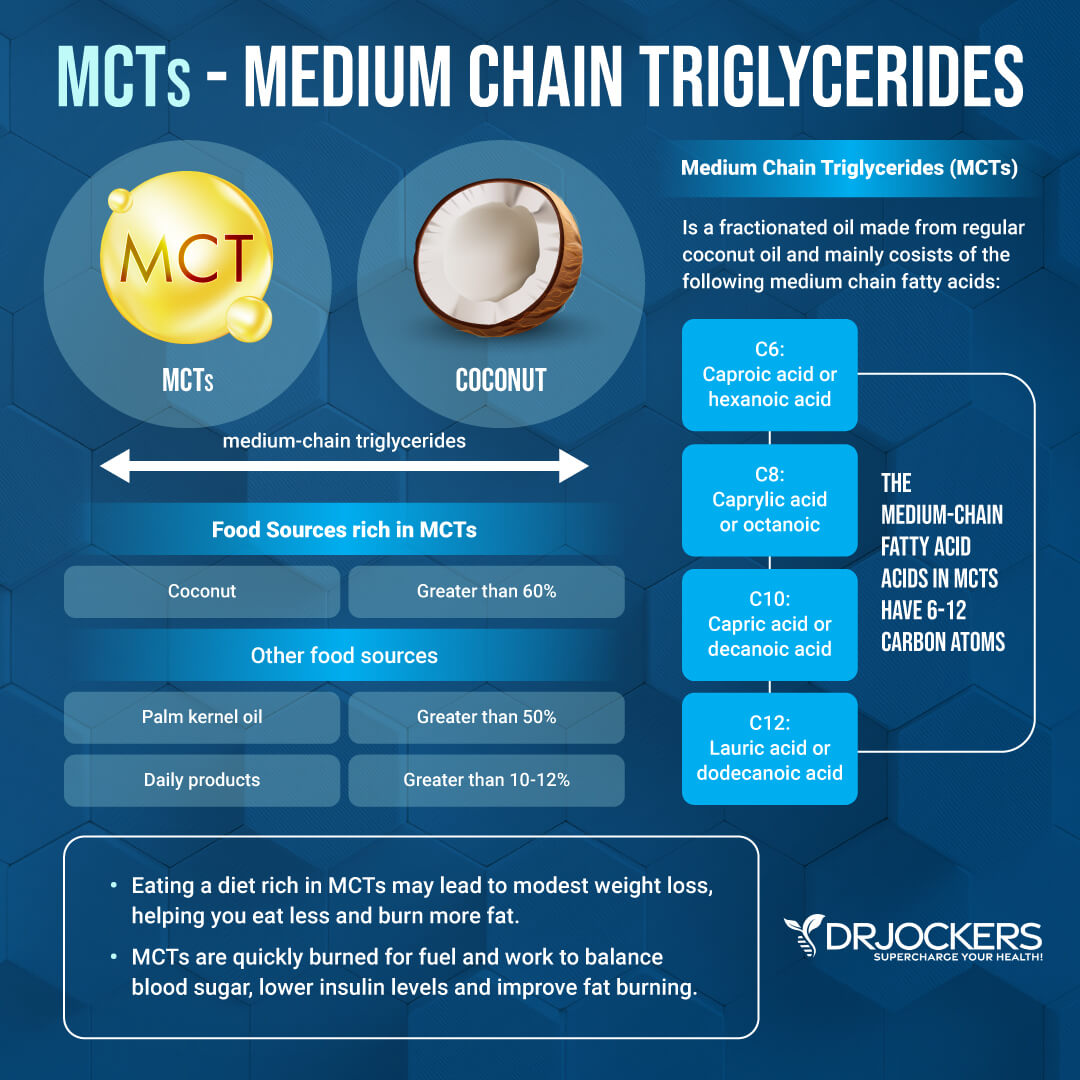
4. Improved Athletic Performance:
MCTs are an elite fuel for athletes or anyone who is performing some sort of physical exertion. This is due to their rapid rate of absorption through the digestive tract, quick metabolic conversion into cellular energy, and their high energy density (24, 25).
Many athletes find great performance benefits using MCTs both pre and post workout. They are the best form of fat to use right before (within 2 hours) and right after exercise due to their quick mobilization and use for rebuilding muscles and preventing the catabolic breakdown of proteins after rigorous training.
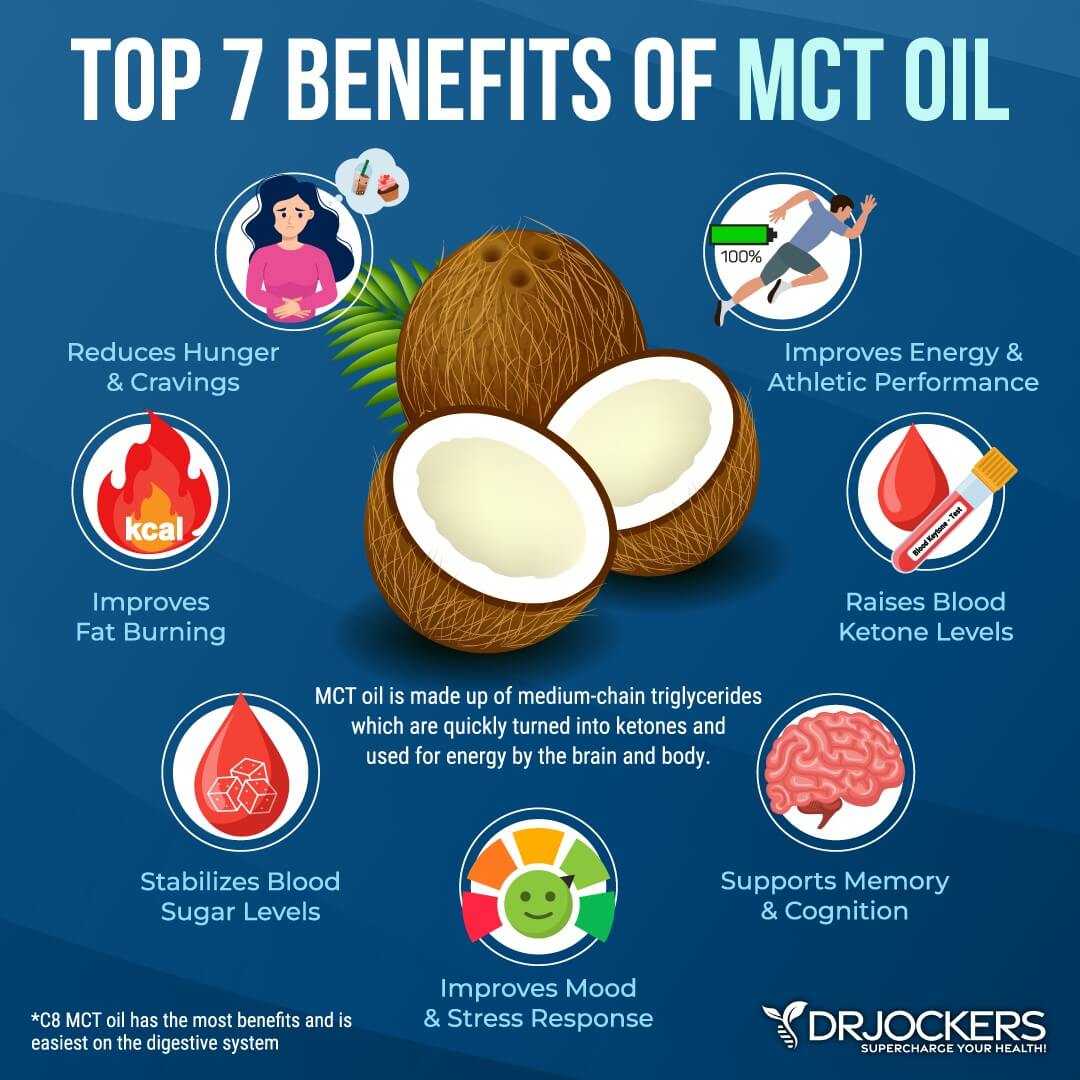
5. Appetite Control and Weight Loss:
Research has shown that MCTs suppress the appetite which helps individuals who struggle with strong cravings and overeating. In a 14-day study, 6 healthy males were put on 3 different unlimited diets: a low MCT diet, a medium MCT diet, and a high MCT diet (26).
The study authors found a significantly lower calorie consumption for those on the high MCT diet. The researchers discussed how substituting MCTs for other fat sources can limit excess caloric intake and result in weight gain.
A number of studies have also shown that when overweight and obese individuals were put on higher MCT oil diets, they were able to lose more weight and had better energy even though they were consuming fewer calories (27, 28).

Problems With MCT Oil Consumption:
Most people tolerate MCT oil very well, however, too large of dosages too quickly can cause gastrointestinal problems such as nausea, diarrhea, and vomiting. If you have this problem, don’t panic and give up on MCT oil right away.
You can easily reduce or eliminate these symptoms by starting with very small doses at a time. This would mean ½ tsp several times daily and slowly increasing the dosage as tolerated.
How To Use MCT Oil:
MCT oil is very versatile and can be used as a salad dressing, in smoothies, for cooking, or just straight up off the teaspoon. Here are the most popular ways to use MCT oil:
Cooking Oil: Highly stable under heat like coconut oil but no coconut flavor
Salad Dressing: No major flavor so it is easy to combine it with herbs and vinegar
In Coffee & Tea: Great for thickening up coffee or tea and improving its health benefits.
Smoothies: Add 1-2 tsps. of MCT oil in a smoothie to curb hunger and have the smoothie keep you satisfied longer.
Introducing Keto Brain MCT Oil:
Keto Brain is a pure 8 carbon chain caprylic acid. It is free of lauric acid and capric acid. This formulation turns very quickly into ketones in the body. This means that it is instant fuel for the brain. It helps to keep ketones up and allows the body to easily switch over from burning sugar to ketones as its primary fuel source.
Keto Brain is extracted from coconut oil in a time consuming process. No metal catalysts are used in the manufacturing process, and every batch of our Keto Brain is tested for heavy metals and other toxins to ensure it is 100% pure.
Keto Brain works directly in cells to give you an extra boost to maximize your performance. Tired of constantly craving sugar or caffeine? Want a thermogenic immune boost with your energy? Try Keto Brain and I am sure you will see a significant improvement!
If you want to work with a functional health coach, I recommend this article with tips on how to find a great coach. Our website offers long-distance functional health coaching programs with our world-class team of health coaches. For further support with your health and other goals, just reach out—our fantastic coaches are here to support your journey.
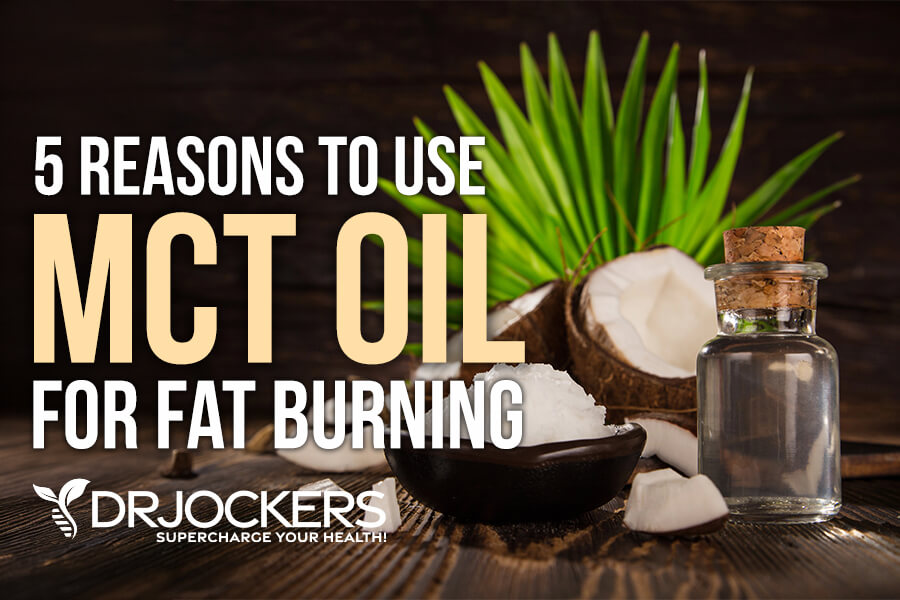
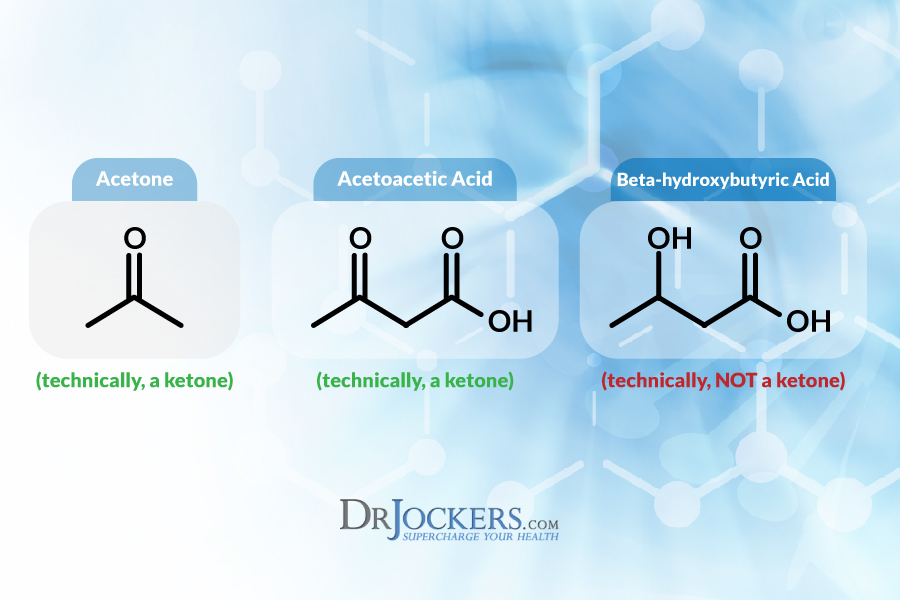

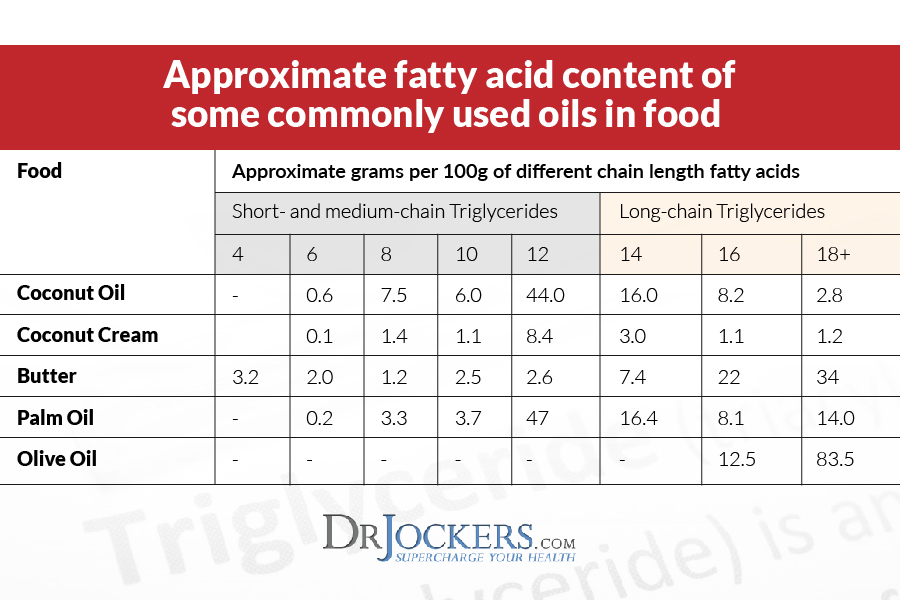
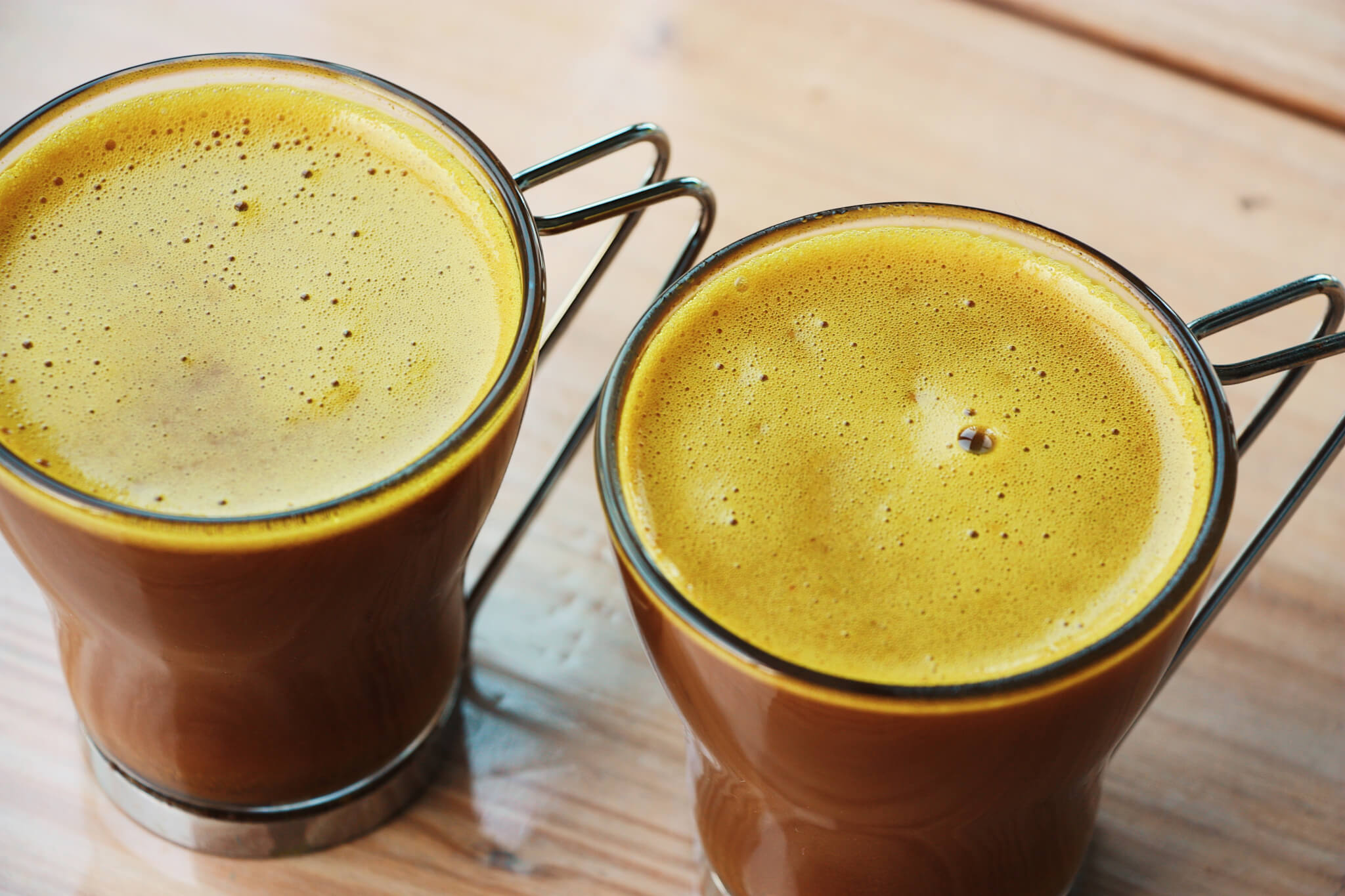





I have been using upgraded XCT Oil for the past week and have benefited from using it daily. Excited to see the health improvements.
Great to hear Sophie!
Adding MCTS to your diet does not promote ketogenesis in the body.
It does add free ketones so when you test you have free ketones.
It’s like having your neighbor in school supply you the answers you have the right answers but you didn’t take the test.
Ketogenesis is the body changing fat stores to ketones. Adding MCTS may give additional fuel but it does not promote ketosis.
You need another test method other than keto strips my friends.
Yes Bill, it adds free ketones and it teaches the body to use ketones as a fuel source.
What is the difference between what Bill says ie. “MCTs does not promote ketosis”, .vs. what Dr. Jockers states as “MCTs teaches the body to use ketones as a fuel source”? To be clear, is Dr Jockers response complimentary or correction?
Thanks!
LT – what I said is the truth. Some of the MCT’s turn into ketones in the system. That dosn’t mean that your body is creating ketones from your own body fat, however, the more the body recognizes ketones in the blood stream the better it gets at using them as a fuel source. Using MCT’s are a great compliment to a ketogenic diet and lifestyle.
You are wrong too doctor. The subject is about MCTS. MCTS convert into ketones via the liver. It is not the same as adding ketones to the body that need no conversion.
Yes they rapidly convert to ketones, especially C8.
We were suggested mct oil for our 1 year old son who started epileptic treatment. They initially said it will improve his bowel as he was constipated but never explained the other benefits. Thank you so much for this article. It enlighted both me and my husband and we will most defnitely be giving him the doses now buy knowing the real benefits
How does upgraded XCT compare to Brain Octane Oil?
Hey Chris, XCT contain C8 & C10 MCTs while Brain Octane is Pure C8. C8 is much more readily converted into ketones than C10 however both ultimately help to form ketones. I hope that helps!
Hi there, Could you clarify then, why you want to cut out C10 for the Brain Octane?
Thank you!
It is easier for the body to convert into ketones so it would be considered the most efficient MCT for doing so. It is more expensive though so XCT is a great alternative for most people.
How much and how often should you consume MCT oil throughout the day? During meals? Supplement in between meals? 1st thing in the morning? Right before bed? Thanks Dr Jockers for all you do.
Hey Dedra,
You can try adding a Tablespoon to each meal whether it be a liquid or solid meal and see how you feel. Any time of day is suitable as it will help your body produce ketones and stabilize energy levels. It is not stimulating so no worries taking it before bed!
What brand of XCT or MCT do you recommend and where tonpurchase? Thx, carol
Hey Carol,
This is the one right here: https://store.drjockers.com/products/bulletproof-upgraded-xct-oil
Thanks Dr. Jockers, the bulletproof xct oil works great
Great! Glad you are enjoying it Dylan!
Is it good to take mct while you have acne ?
Absolutely Ruby! Also check out this arcticle https://drjockers.com/18-ways-to-beat-eczema-acne-and-psoriasis/
I have Lyme disease, I have Graves disease and Hashis and yes I have both, I do not have a gallbladder and have MTHFR Gene mutation ( homozygous C677TT) if I don’t stay on a very strict diet or don’t stay on adipex I can gain weight extremely fast. I’m talking 10-15lbs in a week. Will this help balance this and how often should I take it
Hi Angela, yes MCT can be helpful and is safe to use on a daily basis! Be sure to use a brand that does not contain lauric acid such as this one: https://store.drjockers.com/products/bulletproof-upgraded-xct-oil
I had ordered a MCT Oil and realized it did not have Lauric acid. Everyone I talked to stated I purchased the wrong one and I should have Lauric acid. Just to confirm you state we should purchase one that DOES NOT have Lauric acid??
No, you don’t want the lauric acid and I explain why in the article above. Lauric acid is not highly ketogenic and is easily found in coconut oil which is 50% lauric acid whereas capric and caprylic acid are significantly more ketogenic and are harder to get in the diet.
Can you tell me the benefits and difference taking your MCT verses avocado oil. My husband thinks I’ll have the same effect as I need to loose 15 lbs.
Many thanks for your advise!
Hey Kathy! Avocado oil does not contain medium chain triglycerides that are easily converted into energy for your body. If you are following a ketogenic diet, then avocado oil would be a good addition but pure MCT oil is a more easily processed source of ketones for energy.
Hi Dr. Jockers,
Is Brain Octane ( 1 table spoon 2 times per day) a safe replacement for Lamictal 100 mg twice daily, or what does would you recommend?
Also, can Brain Octane help to increase a low thyroid levels?
Hey Julie, I am not qualified to tell you to stop taking any medications but using MCT to raise ketone levels can be helpful for epileptic disorders. Ideally, you will also want to follow a ketogenic diet.
How is XCT or MCT oil for individuals with high cholesterol? What do you suggest for reducing the LDL?
Hey Stephan, these oils can be great for improving cholesterol panels, especially when combined with a ketogenic diet. Check out these articles:
https://drjockers.com/11-steps-to-beat-heart-disease-naturally/
https://drjockers.com/cholesterol/
Hi Dr Jockers.
I have 2 MCT detail question and was happy to see you are still active on this post.
1. Your point #1 with the cited research (19) somewhat addresses this question, but I’m trying to get a better sense of how MCT supports ketosis vs just temporarily increasing ketone levels due to MCT’s exogenous nature. For example, does MCT oil actually aide entering ketosis if one where to measures levels after the MCT based “spike” in ketones when compared to a theoretical control group without MCT oil? If so, what are the currently understood mechanisms for this?
2. I’m curious about your opinion on some of the unknowns about MCT Oil, such as Dr Longo’s point that we don’t know what the long term effects are of/(if we are) pushing the body in two metabolic directions. I don’t think this concern applies to once already be in nutritional or fasted ketosis, but I do think it is interesting in regards to the idea of using MCT Oil as a mechanism to allow more carbohydrate consumption while staying in ketosis as defined by higher levels of ketones. For example, if MCT oil induces hypoglycemia but you are still eating higher carbs, where do the extra carbs go?
Thanks
Dave
Hey Dave,
1. Essentially MCT is processed coconut oil. Your body makes ketones in a similar way it would from ingesting fats, just at a quicker rate and without as much processing by the digestive system and liver.
2. I would only be concerned with someone who is chronically hyperglycemic while also being hyperketonic. This mirrors keto acidosis and is not a natural state for the body.
Is it safe to take MCT Oil while taking Eliquis?
Yes it is Barbara!
if excess MCT oil is not stored as fat
and if mct oil is converted to ketones and excess ketones are excreted
then when you count the NET CALORIES in a tablespoon of mct oil
would if be reduced compared to regular fat calories
sorta like net carbs when you subtract the fiber content out
This is likely the case Larry, and why I don’t recommend counting calories. Your metabolism completely changes when in ketosis and so the number of calories is almost irrelevant. More important to make sure you are consuming enough fat and very little carbs. Once in ketosis, hunger is most often the best gauge of how much you should eat.
Appreciate your straightforward article, very informative. I have a question about not counting calories…and the idea of “very little carbs”. I’ve read 70/20/10% in fat/protein/carb % breakdown. Since there are non-starchy vegetable carbs and starchy carbs, sweet potato carbs don’t metabolized the same as kale carbs. Can you elaborate a bit? What would be considered very little carbs in % of total calories for both types of carbs based on the 70/20/10 split? Thanks
In general, we are speaking net carbs (total carbs – fiber). Keep this under 20 ideally and definitely no more than 40 grams per day. Hope that helps!
Dr. Jockers is it possible to have an allergic reaction to mct oil such as swelling of the throat blocking all air. I started off to strong I believe. I took 4 tablespoons in one day and no side effects. The next day I took a dose and no sides. Took again hours later and started eating and began choking. No food in the airway. Luckily, I work at a hospital and was here when this happened. So bad they treated me like a trauma patient.
I tried a little test the next day by placing a little on my finger and tasting. My throat became just a little itchy and felt a little tightness in my chest.
What do you recommend? Am I allergic? I have never been allergic to coconut oil. I cook with it all the time.
So sorry to hear this! Yes it is possible to have an allergic reaction to anything. I would avoid the MCT for a while and if you want to try it back in a few months…you want to try a different brand.
Dr. I have an acne when I was teenager and until now one i a while. I am using proactive topical cream. It did help me but it is not working well with my children as they have it too as they became teenagers. Can MCT be effective for them?
Tess
Dr. Jockers,
I have been subjected to what they call long-term carbon monoxide exposure. I was exposed to a low consistent amount for 9 months. After being treated with oxygen therapy for 24 hours. I thought I for lack of better words, dodged a bullet. 30 days after the oxygen treatment. I started to become sick with several, not so ordinary symptoms. Long story short 3 years later I have been diagnosed with the following:
Lupus
Fibromialgia
IGG insufficiency
Venous insufficiency
Endocrine deficiency
Anoxia
Brain Demiliazation
Just to name a few…
The brain fog from lupus is cronic. Will this oil help with any of my symptoms?
I have chosen to stop the pharmaceutical route for treatment due to side effects, cost, and time spent at hospitals.
I am a single mother of 3 young children, one with Autism and I have no time to be this sick. I have no support system and am in need of a supplement that will help give me and my children some quality of life. Because, I am not living, I’m existing. I would be in measurably grateful for ANY suggestions.
Thank you
Jean-Marie
So sorry to hear about this Jean-Marie, the oil itself will have limited effects. It will have more benefits if you use it in conjunction with a ketogenic diet and potentially even hyperbaric oxygen therapy to help reverse what damage has been done. You may want to consider working with one of our health coaches to put together a comprehensive plan to address as many factors as possible.
Great Article! I was wondering if there is stores sugar in the fat cell and MCT oil is used and produces ketones will the body prefer the ketones to use for fuel? If so and the body is now using fat as a fuel source what happens to the sugar that’s been stored? Does it eventually get used up when the fat is burned off.
If I understand correctly keystones are produced when there is no carbs/sugar left to use. But in case that there is stored sugars and MCT is used in coffee or something like that then the liver will produce ketones and if the body uses the key tones does the stored sugar get used and out of the body at some point and does once your liver converts the MCT and ketones are gone I guess it goes back to the stored sugar?
Thank you so much!
Hey Mike, if you are following a ketogenic nutrition plan that is low in carbs and high in healthy fats then you will continue to burn ketones and fats! If you are not following a ketogenic eating plan then you will likely go back to burning sugar once the mct oil has been metabolized.
Hi Dr Jockers I have been following Dr Jelineck’s OMS diet for over 10 years, I fact probably since my diagnosis of multiple sclerosis. Luckily I’ve been in remission for most of the time but have suffered significant fatigue, brain fog and chronic pain.
Within the last year I have all but eliminated the pain and as a result my brain fog has lifted and I am now working on stimulating favourable neuroplasticity and regaining strength. I’ve recently read Dr Wahls’ book, The Wahls Protocol and am just about convinced that I should switch to her dietary guidelines and adopt her Wahls Paleo Plus diet with its inclusion of MCT.
What are you thoughts on these two completely differing dietary guidelines and which would you chose to follow if you had MS.
Many thanks for answering this tough question.
Simon
Hey Simon! This is my perspective: https://drjockers.com/treat-multiple-sclerosis-naturally/
Hi Doc…
I really enjoyed this article!!!.. quick question though.. I’m 70lbs over weight and just started the keto diet a week ago.. I am in ketosis very good average of 60 on the urine pee strips.. and I’m wondering should I add ketones through using mct oil.. or should I burn my own ketones?? which will help me lose weight the fastest??? I may not fully understand how it works yet??? Seems like I should burn mine and not add extras??? Am I confused???
Hey Scott, here are your best strategies for this: https://drjockers.com/5-advanced-fat-burning-strategies/
Is it safe to take this while on Metformin for type2 Diabetics?
Yes it is Samantha!
Just wandering if this would be good for me,I’m 67 had a brain aneryerisum, everything is good but wondering if th his mct would affect it at all, also I have no gallbladder, and very small veins an arteries,
This would be great for you Sue!
Have been on Keto diet for five weeks and on 16 hours daily fasting (using MCT oil in my coffee as well). I am still not fat adapted, havent lost any significant amount of weight (3lbs over five weeks) and still experience hunger and sugar cravings. My Blood sugar after 16 hours fasting 5.7 and ketones strips tests indicate low ketones level despite the low carbs diet 15-25 g carbs daily. Any recommendations?
Hey Amy, check out these two articles and see if you are hitting all of these strategies:
https://drjockers.com/10-biggest-ketogenic-diet-mistakes/
https://drjockers.com/metabolism-mistakes-fat-burning-errors/
Can I consume MCT oil uring the fasting period of 16-8 or does itbreak the fast?
It will break a fast for sure Renie!
I’m a type 1 diabetic (for 34 years & on a pump for the last 6 years) and have been on the Keto diet for a couple of years. I had noticed that when my sugar levels were very low (hypo) in the morning, I wasn’t feeling confused or seeing spots, like I used to before eating LCHF. However, I hadn’t realised it was the ketones causing this. My question is…. how best should the hypo be treated? To avoid eating glucose I’ve been suspending my pump’s basal doses for about half an hour and drink a mug of chicken broth (home made), which raises my sugar level to a safe range. If I didn’t routinely check by blood, to realise I was low, would the hypo be resolved by the ketones alone?
Hey Leonie, if your ketones are elevated, blood sugar is slightly low, and you feel good – then this is a good sign you are burning fat well!
Hi Dr Jockers, I did keto about 3 times for about 10 days each time – but I could not sustain eating all the greens , meat , fish , cheese as I found that i couldn’t eat the volume of these foods -it was too restrictive and I got sick of eating these things . I lost 4lbs only and that also put me off. I also found it expensive.
I am now doin a low carb diet -I lost 4lbs in first 4 days but then things slowed down a lot. I wanted to ask would MCT oil help me lose more weight on this diet??
Is it worth me buying it??
Or would it not work because it’s not a strict keto diet ??
I can’t face doing a strict keto diet again.
Thanks in advance for taking the time to answer my question. marie
Yes absolutely MCT oil will help and I would recommend it.
Is it safe to take c8 mct oil while on total food replacement,, I.e I’m substituting meals for shakes and bars,, I have read that it’s better to take with actual food.
Hey Laura – it is best to use it with meals and not to take it as a meal replacement alone. You can’t get enough MCT oil in a sitting to have it as a meal replacement. It is good to put in shakes.
Hello Dr. Jocker – currently I’m on a low carb diet and run 3-6 miles at least 3 times a week. I usually take fat burners and was wondering if I could combine it with the MCT oil. I don’t want to do keto diet at all, too strict for me. Thanks.
Yes you could try that!
Hello Dr. Jocker,
ty for great article.
Can i use mct oil during exercise or i dont need it? I mean use it like carbohydrates for protect power,muscle or reduce cortisol. Sometimes i train 2-3 hours ( i hope it is ok when i am on keto diet). I find information that it can be use like pre or post – workout but nobody talks about mct during exercise. Thank you in advance for your answer.
Hey Lewis, MCT oil is excellent source of fats to boost ketone production and stabilize blood sugar! MCTs are immediately metabolized into ketone bodies to be used for quick energy in the body. I would recommend it pre-workout to increase endurance and improve stamina but consuming it whenever possible is beneficial! Just make sure you are choosing a high quality MCT oil for optimal benefits.
Dr. What is the research that supports that the c8 passes the brain membrane? I have searched for it and can’t find it…
Hey Marilu, Both of these two references here and here support that C8 (octanoic acid) is oxidized by specific brain cells and fuels neuronal energy.
Dr. Jockers,
According to your article explaining relation of underactive thyroid and diabetes, keeping blood sugar at lower levels doesn’t make any good for underactive thyroid ( as the thyroid hormone needs glucose to function properly and if there’s not enough glucose in blood, the cortisol has to kick in, liver not storing needed glycogene and problems with insulin resistance begins causing diabetes.
I have underactive thyroid, was taking dessicated thyroid 90 mg and felt ok and had optimal T3 but my TSH dropped to 0.03 mlU/L ( reference range: 0.32-4.00) and sometimes even lower, so I decreased DTH to 60 mg.
With lower dose of DTH feeling tired and not enough energy again. My Cortisol levels high – almost at the top range. Glucose fasting 5.8 nmol/L ( range: 3.6-6.00), ketones 0.5 mmol/L.
1. Can I keep my TSH supressed in order to keep optimal T3?
If not, what is the importance of keeping TSH at least in the lowest range?
2. Is it ok for me to follow low carb diet
OR keep in ketosis state to keep my weight at check and gain energy- if sufering from underactive thyroid?
3. Will my hypothyroidism lead to diabetes if I follow low carbs diet?
4. What’s the best approach for me?
Your detailed and thorough reply to my questions is extremely important for me as I feel confused in regards to relation of low thyroid /low carb diet and don’t know what to do. Feel desperated.
Hey Alina,
These are complicated questions that would be best answered by a functional health coach that understands your lab results and health history. Here is a helpful article for you: https://drjockers.com/functional-nutrition-tips-to-find-a-great-health-coach/
Hello!
I typically do an 18 hour fast, 5 days a week. My last meal is around 7pm. When would be the best time to consume my first teaspoon? In my morning coffee, or should I wait until I am breaking my fast? I hear a lot of conflicting information on this.
Thank you!
I recommend doing it during your feeding window.
Hi Dr. Jockers. I recently purchased ketobrain. Can you please tell me for weight loss, appetite and sugar Control what is the best time of day to take it? Thank you so much. I’ve been following you for years and you helped me so much with so many things. God bless!
Robin